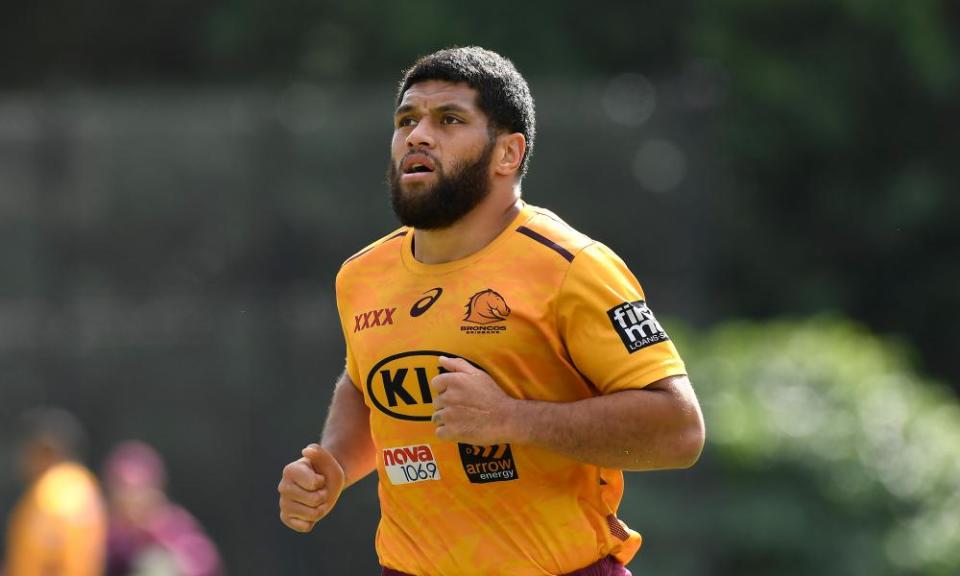NRL dithers as onus put on clubs to navigate Covid-19 vaccine issue

Peter V’landys has long styled himself as a decisive leader who rules with a strong hand and does all he can to protect his patch of turf. It is because of this that the NRL became one of the first leagues in the world to restart after the pandemic shut down sport across the globe. On the subject of Covid-19 vaccinations, though, V’landys and the NRL have left both the grunt work and the leadership to clubs.
Related: Australian sport’s reckoning with Covid-19 vaccination
The NRL has not made vaccination mandatory and V’landys has previously urged clubs not to sack players who refuse it, citing measures which could be utilised to allow vaccinated and non-vaccinated players to operate together safely. In October he told Nine the NRL was encouraging clubs to reach 95% vaccinated status, at which point he said the NRL’s advice was that there was no significant risk.
This week Canterbury became the first club to end their relationship with an unvaccinated player by letting go of 138-game veteran John Asiata. “The Bulldogs and John Asiata have agreed to part ways by mutual consent,” the club said in a statement. “Asiata signed with the club this season, but had yet to train with the squad.”
Canterbury football manager Phil Gould said he had been “hoping” Asiata would change his mind last month but that the club would explore options should he decide against the jab.
The lack of consistent policy across the game has created wildly different expectations among clubs on how to handle unvaccinated players and staff.
It stands in stark contrast to the AFL’s policy of no jab, no play for the 2022 season. One player has so far retired and others have been informed they must be double vaccinated if they want to participate in the national competition.
“The policy reflects the AFL’s strong-held view that as the governing body of the sport, we share a responsibility to address the risk of exposure to Covid-19” an AFL statement said in October when the governing body released its policy.
In November the NRL estimated around 20-24 players were yet to be vaccinated and chief executive Andrew Abdo has been forced to defend the governing body’s policy, saying he didn’t think there was “anything soft” about their rules. “We want people to have the freedom of choice, which I think is important,” Abdo said. “But we are putting health at the forefront of our policy which is why we believe in vaccination, we want everyone to get vaccinated.”
The NRL was contacted for comment on this story but did not respond.
It is a policy on which the league may quickly need to change tack given the disparity both between clubs’ handling of the issue and their geography – the New South Wales state government is taking a significantly more liberal approach than its Victorian and Queensland counterparts.
At clubs such as South Sydney, all players and staff are vaccinated. “We, like most clubs, would have preferred compulsory vaccination as the simplest and most effective protocol” Rabbitohs chief executive Blake Solly said. “We recognise the complexities that the RLPA and NRL are dealing with and respect their work on the process, but I think everyone wants to get to a position where the risk of disruption to the 2022 NRL season is minimised.”
Others, such as Melbourne, are attempting to navigate Nelson Asofa-Solomona’s resistance to the Covid vaccine; Victorian health regulations meant he was unable to resume pre-season training on Tuesday as scheduled.
Storm chief executive Justin Rodski said a decision had not yet been made on his contract. “We’re not putting any further pressure on Nelson other than we’re really hopeful a decision will be made shortly and he’ll be able to return in January,” Rodski told News Corp on Tuesday.
Meanwhile, at Manly, an unvaccinated senior football department staffer allegedly led a training session without a mask.
The Sea Eagles have been forced to defend the situation, saying that they are adhering to NRL protocols – the primary concern is the flimsiness of said protocols and how they line up with community expectations.
The vaccination status of staff is quickly becoming a significant concern for the NRL. Football department staffers are generally viewed as leaders within a club and play a notable role in setting standards and shaping thinking. They are also typically less in the public eye than players. Not making vaccinations mandatory allows for situations that can quickly escalate. The lack of a clear-cut policy is causing both angst and concern for stakeholders within the game.
One senior club official said vaccination status played a significant role in recruitment and retention decisions. “We will not sign an unvaccinated player,” the official said, in a sign vaccination status could quickly become a useful means of salary-cap management.
The NRL must lead on vaccination rather than defer – if for no other reason than self-interest. Rugby league cannot afford to lose games, nor can it afford to put the season on hold.

 Yahoo Finance
Yahoo Finance 